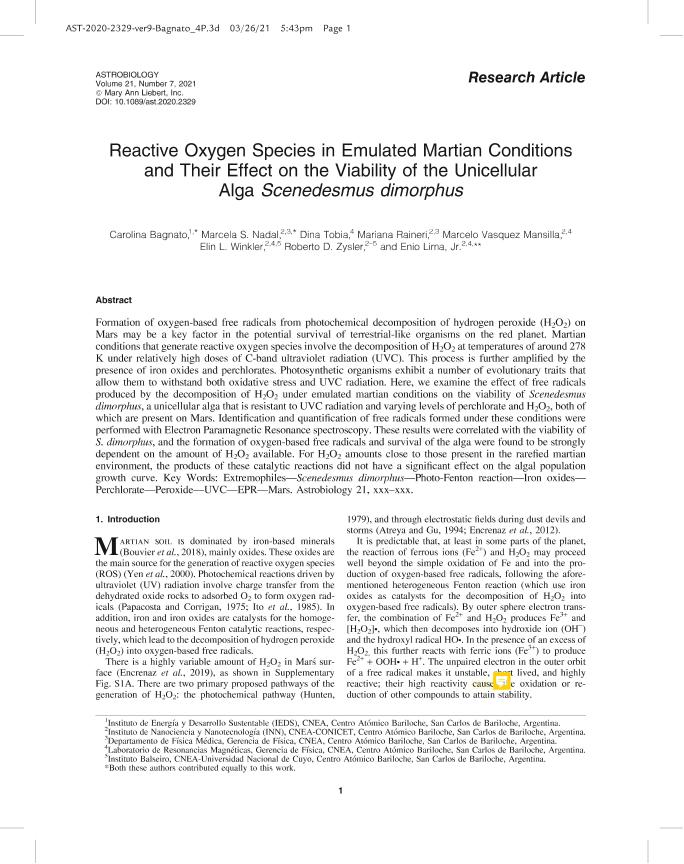Artículo
Reactive Oxygen Species in Emulated Martian Conditions and Their Effect on the Viability of the Unicellular Alga Scenedesmus dimorphus
Bagnato, Carolina ; Nadal, Marcela
; Nadal, Marcela ; Tobia, Dina
; Tobia, Dina ; Raineri Andersen, Mariana
; Raineri Andersen, Mariana ; Vasquez Mansilla, Marcelo
; Vasquez Mansilla, Marcelo ; Winkler, Elin Lilian
; Winkler, Elin Lilian ; Zysler, Roberto Daniel
; Zysler, Roberto Daniel ; Lima, Enio Junior
; Lima, Enio Junior
 ; Nadal, Marcela
; Nadal, Marcela ; Tobia, Dina
; Tobia, Dina ; Raineri Andersen, Mariana
; Raineri Andersen, Mariana ; Vasquez Mansilla, Marcelo
; Vasquez Mansilla, Marcelo ; Winkler, Elin Lilian
; Winkler, Elin Lilian ; Zysler, Roberto Daniel
; Zysler, Roberto Daniel ; Lima, Enio Junior
; Lima, Enio Junior
Fecha de publicación:
04/2021
Editorial:
Mary Ann Liebert
Revista:
Astrobiology
ISSN:
1531-1074
Idioma:
Inglés
Tipo de recurso:
Artículo publicado
Clasificación temática:
Resumen
Formation of oxygen-based free radicals from photochemical decomposition of hydrogen peroxide (H2O2) on Mars may be a key factor in the potential survival of terrestrial-like organisms on the red planet. Martian conditions that generate reactive oxygen species involve the decomposition of H2O2 at temperatures of around 278 K under relatively high doses of C-band ultraviolet radiation (UVC). This process is further amplified by the presence of iron oxides and perchlorates. Photosynthetic organisms exhibit a number of evolutionary traits that allow them to withstand both oxidative stress and UVC radiation. Here, we examine the effect of free radicals produced by the decomposition of H2O2 under emulated martian conditions on the viability of Scenedesmus dimorphus, a unicellular alga that is resistant to UVC radiation and varying levels of perchlorate and H2O2, both of which are present on Mars. Identification and quantification of free radicals formed under these conditions were performed with Electron Paramagnetic Resonance spectroscopy. These results were correlated with the viability of S. dimorphus, and the formation of oxygen-based free radicals and survival of the alga were found to be strongly dependent on the amount of H2O2 available. For H2O2 amounts close to those present in the rarefied martian environment, the products of these catalytic reactions did not have a significant effect on the algal population growth curve.
Archivos asociados
Licencia
Identificadores
Colecciones
Articulos (UE-INN - NODO BARILOCHE)
Articulos de UNIDAD EJECUTORA INSTITUTO DE NANOCIENCIA Y NANOTECNOLOGIA - NODO BARILOCHE
Articulos de UNIDAD EJECUTORA INSTITUTO DE NANOCIENCIA Y NANOTECNOLOGIA - NODO BARILOCHE
Citación
Bagnato, Carolina; Nadal, Marcela; Tobia, Dina; Raineri Andersen, Mariana; Vasquez Mansilla, Marcelo; et al.; Reactive Oxygen Species in Emulated Martian Conditions and Their Effect on the Viability of the Unicellular Alga Scenedesmus dimorphus; Mary Ann Liebert; Astrobiology; 21; 6; 4-2021; 692-705
Compartir
Altmétricas



